What Makes a Service Dog Legal?

According to the U.S. Department of Justice, the Service Animal is defined as a dog that is specifically trained to perform a task (or tasks) for an individual with a disability.
With this definition in mind, a Service Dog is not an ordinary pet or even one that is being used for emotional support (ESA).
In this post, we will take a more in-depth look at this topic to uncover what makes a Service Dog legal.
A Service Dog is NOT an Emotional Support Animal
There may be some confusion as to the difference between a Service Dog and an Emotional Support Animal. As we mentioned earlier, the Service Dog must be specifically trained to perform a task that the person cannot do for themselves.
This includes (but is not limited to);
- Guiding the blind
- Pulling a wheelchair
- Opening doors
- Alerting to an oncoming medical condition
- Reminding the individual to take medications
- Alerting those with hearing impairments
An Emotional Support Animal is defined as any animal that is being used by an individual with a mental or emotional disability for comfort. This can include helping people with social anxieties, PTSD, phobias, anxiety, and depression. Unlike a Service Dog, an ESA is not specifically trained for providing a task(s) for their owner.
Unlike an Emotional Support Animal, Service Dogs are allowed into all areas where the general public has a right to go. This includes restaurants, hotels, theaters, public transportation, libraries, retail outlets, malls, etc.
How Do I Qualify for a Service Dog?
Before you can have a legitimate Service Dog, you must have a disability that requires the assistance of a canine companion. Some disabilities are obvious and therefore will need no explanation for the dog. Other conditions may not be so visible, but that doesn’t mean you are not entitled to having one.
The Americans With Disabilities Act (ADA) does have a clear definition as to what is considered disabled. If you are unsure, ask your doctor if you may qualify for a Service Dog.
To register your dog and get your service dog ID card, please complete the registration below.
What Makes a Service Dog Legal?
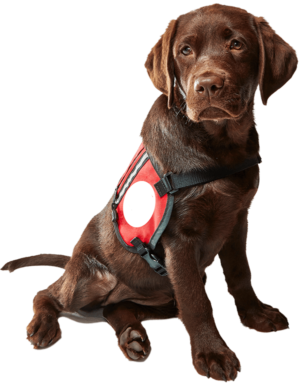
Training of the Service Dog to perform a specific task is key to it being legitimate. According to the ADA, the Service Dog does not need to be professionally trained, meaning the disabled individual may go through this process themselves.
However, be aware that the handler of the dog is 100% responsible for that canine in all situations. The Service Dog must be under your control at all times. It cannot exhibit any unruly behavior such as jumping, begging, wandering off, barking, lunging at people, etc.
The ADA also does not consider a Service Dog in training a full-fledged assistance animal, so it is not yet allowed into those public areas that are normally off limits to dogs.
The Service Dog is also not legally required to wear any identification of its status; however, having a specifically marked vest, harness or badge will make it easier when you are dealing with the general public.
What Questions Can Be Asked of Me?
In situations where your disability may not be obvious, there are only two questions that may be asked of you;
- Is the dog a service animal required because of a disability?
- What work or task has the dog been trained to perform?
Note: The staff are not allowed to request any documentation for the dog, require that the dog demonstrate its task, or inquire about the nature of your disability.
You and Your Service Dog
If you have a disability and need the help of a Service Dog, know your rights. You are allowed to have this working animal with you in all areas open to the general public. However, your dog must be well behaved and in your control at all times. If your disability is not openly visible, staff members are only legally able to ask you two questions in regards to your Service Dog.
Don’t suffer another minute when a Service Dog may be the answer to getting you back on the road to living a more productive, normal life.
About the Author: The writing team at Service Dog Certifications is made up of folks who really know their stuff when it comes to disability laws and assistance animals. Many of our writers and editors have service dogs themselves and share insights from their own experiences. All of us have a passion for disability rights and animals.
14 comments
Leave a Reply Cancel reply
Latest Posts
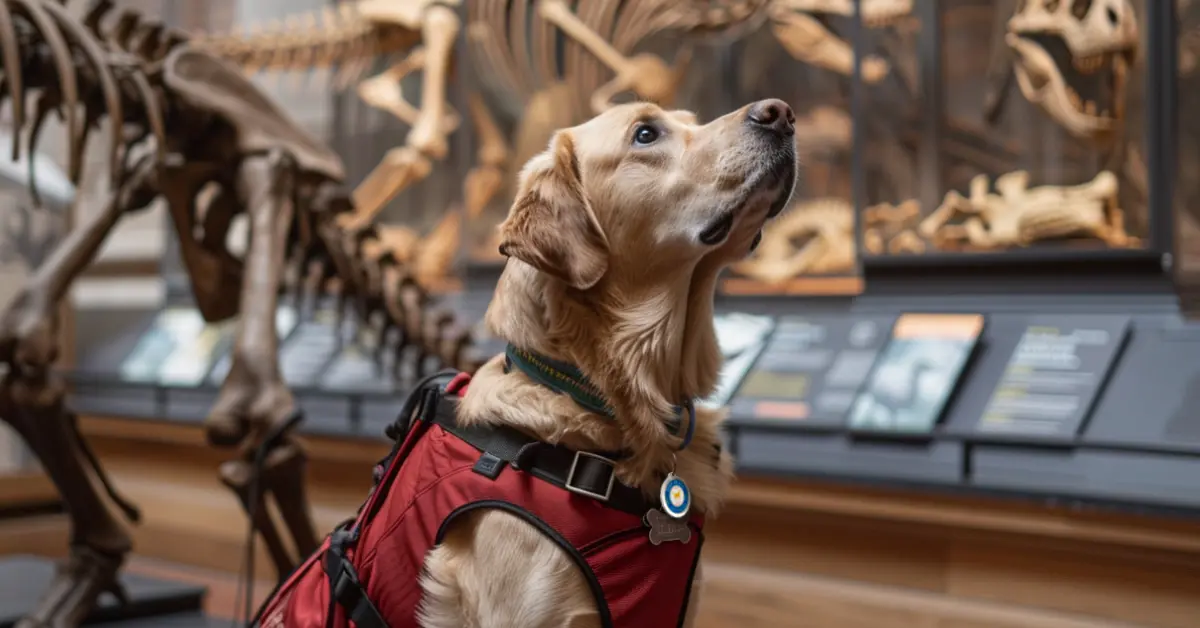
Can you bring a service dog to a museum?
Yes, you can bring your service dog to the museum! All the major U.S. museums welcome guests with service animals in accordance with the Americans with Disabilities Act (ADA). There are some areas, however, that might be off-limits. Here’s what you should know if you plan to spend a day at the museum with your […]

Read More

How to Bring a Service Dog to Six Flags Magic Mountain
Service dogs are welcome at Six Flags Magic Mountain so long as they are, according to Six Flags, “trained to do work or perform tasks for people with disabilities.” Of course, your dog must be housebroken and remain on a leash or harness and under your control while at the park — and the park […]

Read More
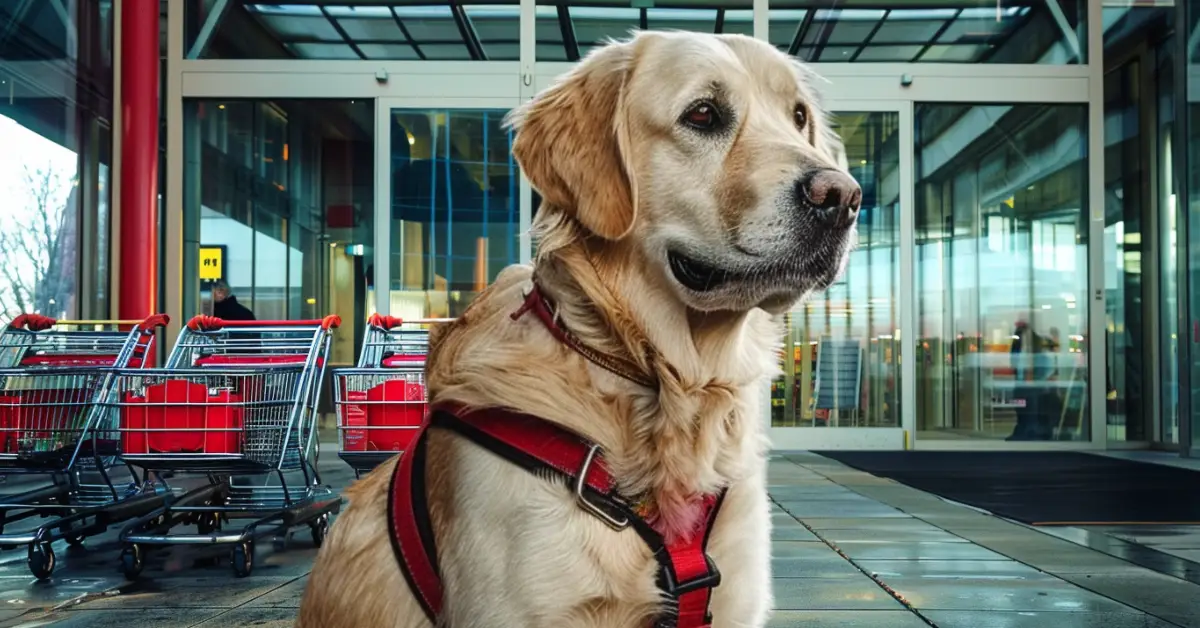
When Stores Can Refuse Your Service Dog
According to the Americans with Disabilities Act (ADA), service dogs should be allowed into any store most of the time. A store owner can legally exclude a service dog if they are actively growling, snapping at, or frightening customers, or if the dog is obviously out of the control of its owner. Ordinary behaviors — […]

Read More
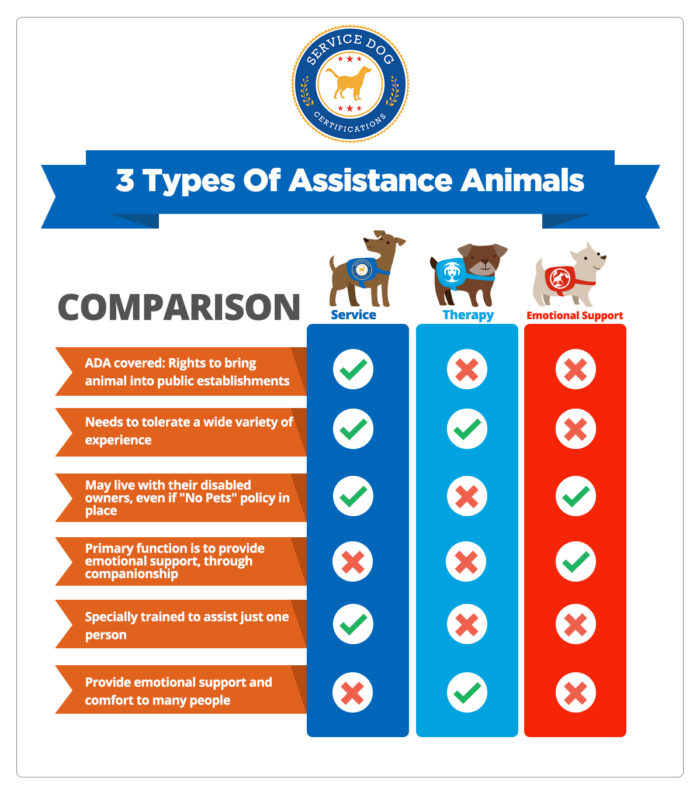

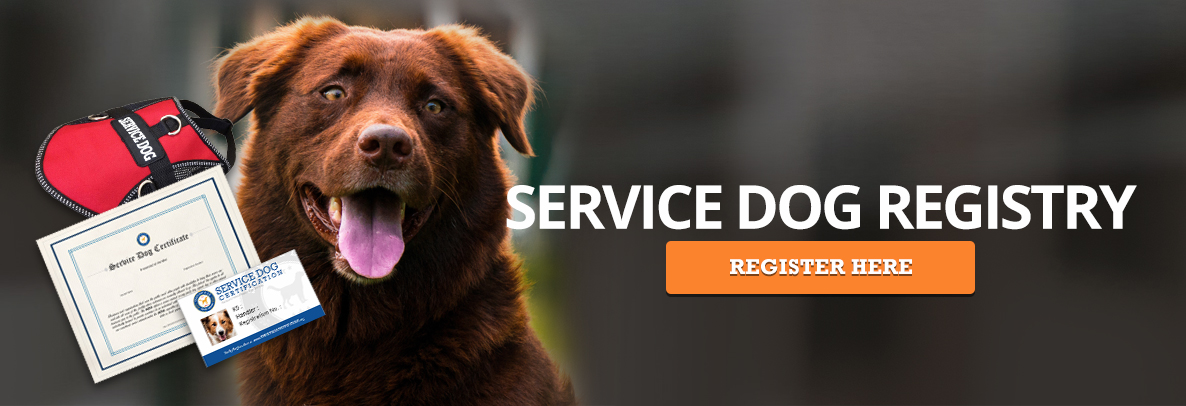
Thank you for this article. I’m wanting to register my dog but I was wanting to no if I had to have a doctor note. This answered and about people asking questions about him as well.
Im getting my puppy in a couple of weeks but the training i was suppose to through here in Texas told me that my dog has to be 12mo old before entering training. I work full time and YES i have a diagnosed disability along w being prior Military w nerve damage. I want to legally be able to take ny dog to work w me as a service dog. I will be getting documentation from my doctor. I thought about doing an online SDR but want to do things the right way and legally w me and my work.
Ok I was in a small restaurant today and two people came in with two pit bulls with steel spiked collars….. the dogs were not identified….. the owners said I’m sorry we do t allow dogs in here and the woman said ….. he’s a service dog and I can just sue you if you would like….. the night before this same couple was I. With a snake and they claimed it too… was a set ice animal….. what protects these business owners!?
This is such a hard question, because many people claim to have a service animal and really don’t, however businesses can ask the two questions. Personally I offer them my dogs registration number up front (primarily at hotels), so that my dog is clearly a legal service dog.
As for protecting their business, if their animal is unruly, they can ask you to leave. Otherwise, the ADA was established to help protect those of us that need a service animal. I’ve also found MANY hotels have adopted a policy of charging a fee for all animals, which they can’t apply to a service animal. I’m always surprised when I have to let them know that.
Also: from the ADA:
1. Q25. When can service animals be excluded?
A. The ADA does not require covered entities to modify policies, practices, or procedures if it would “fundamentally alter” the nature of the goods, services, programs, or activities provided to the public. Nor does it overrule legitimate safety requirements. If admitting service animals would fundamentally alter the nature of a service or program, service animals may be prohibited. In addition, if a particular service animal is out of control and the handler does not take effective action to control it, or if it is not housebroken, that animal may be excluded.
2. Q28. What can my staff do when a service animal is being disruptive?
A. If a service animal is out of control and the handler does not take effective action to control it, staff may request that the animal be removed from the premises.
I have epilepsy and recently got GSD puppy. I am training her myself and she is progressing at amazing pace. My question is, can I register her as a service dog now or does her training need to be complete before doing this? Thank you.
Great to hear your dog is already doing an amazing job. Unfortunately, a service dog in training is technically not a service dog, yet. Only once your dog can perform the task needed, it can officially be called a service dog. Therefore, it might be too early to order an ID. You can order a vest with a patch saying “Service Dog in Training”. That can help prevent other people from approaching and disturbing your training session. You may find this article on service dog requirements and training interesting https://www.servicedogcertifications.org/service-dog-requirements/ .
I have a Chihuahua that knows when I am having a panic attack, he immediately puts his paws on my chest and calms me down before it becomes a problem. He doesn’t open doors or anything like that but he does provide a service… Does this count? I want to be legal with all of it and respectful. Thank you
To qualify for a service dog, you need to meet two major requirements: you must have a disability as the term is defined in ADA rules, and your dog must be trained to perform a task or job relating to that disability.
I think it does!
Ok so they can ask the 2 questions but do you have to show them what they perform for you as a service?
Third parties are not allowed to ask service dog owners to have their dog demonstrate the trained task.
Are the cert/packages you purchase of the internet legit ?
Do the certificates need to be signed by a Dr ?
Please see this link for info on what it means to certify a service dog: https://www.servicedogcertifications.org/how-to-certify-a-service-dog/